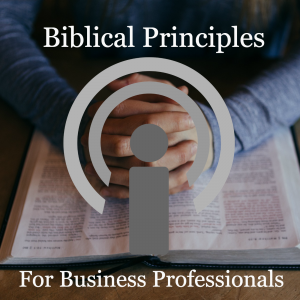Biblical Brinciples for Business Professionals

Meaningful Dialogue, Part 2 - Biblical Principles for Business Professionals
As a marketplace missionary, you are probably more than willing to answer questions concerning your faith. You may even have a strong defense of the faith, a solid defense for the “hope that is within you.” However, my guess is that not many people are approaching you and asking you about your faith. They aren’t knocking on your door on a regular basis with specific questions about why you believe what you believe. You would welcome more people to ask, and you are ready and willing to answer.
As marketplace missionaries, sometimes we will have to start the dialogue. Don’t sit around waiting for others to ask you questions. Begin the meaningful dialogue yourself.
As mentioned in the previous blog/podcast, each worldview has to answer life’s important questions. These four questions have been recycled for millenniums — four questions that every worldview must address. These questions are:
* How did we get here? (How did we arrive on this planet to begin with?)
* Why is the world such a mess? (Why is there evil; why do bad things happen?)
* Is there a solution? (Or, what is the solution?)
* What do we do about it? (Or, where do we go from here?)
These questions make people think about their particular world views. There are many different questions one can ask when beginning meaningful dialogue. The four questions I asked have been used extensively by many, and several others use those four questions as a guide/starting point for meaningful dialogue.
How Did We Get Here?
Let’s look more at the first question: How did we get here? (Or, how did we arrive on this planet to begin with? Why do humans exist to begin with?)
We know the answer to this question. It is found in Colossians 1:16-17, “For by Him all things were created, both in the heavens and on earth, visible and invisible, whether thrones or dominions or rulers or authorities—all things have been created through Him and for Him. He is before all things, and in Him all things hold together.” We also know that the very first verse in the Bible is “In the beginning, God created the heavens and the earth.”
The way someone answers this first question will give you some very good insight into one’s belief system. It will most likely let you know whether the person is an atheist, an agnostic, a humanist, a Christian or some other religion.
This is not the time to argue creation versus evolution, nor is this the time to discuss the finer points of Creation, or to dive right into the first chapter of Genesis. This is the time to listen and find out where the person is in regard to her/his worldview.
Instead, continue with follow-up questions concerning one’s purpose for existing, asking questions such as, “Do you believe we have a purpose for being here?” and/or “What is our purpose on this planet?”
This would be a good time for you to emphasize that you believe that we were not created by accident, and that there is a loving God who created us in His image. We are the reason he created the rest of the world. We, therefore, are special and we have purpose. We are the crown of creation.
If he or she answers the question by saying that God created the world and that He has a purpose for us, obviously you can move on to the next question. However, he or she may or may not believe that Jesus is the Son of God.
Ephesians 2:10 says that “We are His workmanship, created in Christ Jesus for good works, which God prepared beforehand so that we would walk in them” (NASV).
We are created with a purpose. This is something that we should convey to others in the marketplace. Place the emphasis on the fact that we were created with a purpose.
Earning the Right to Ask
In order to engage in meaningful dialogue and in order to “earn the right” to ask the questions, you need to have a relationship with the person in which you want to ...






 Visit Podcast Website
Visit Podcast Website RSS Podcast Feed
RSS Podcast Feed Subscribe
Subscribe
 Add to MyCast
Add to MyCast